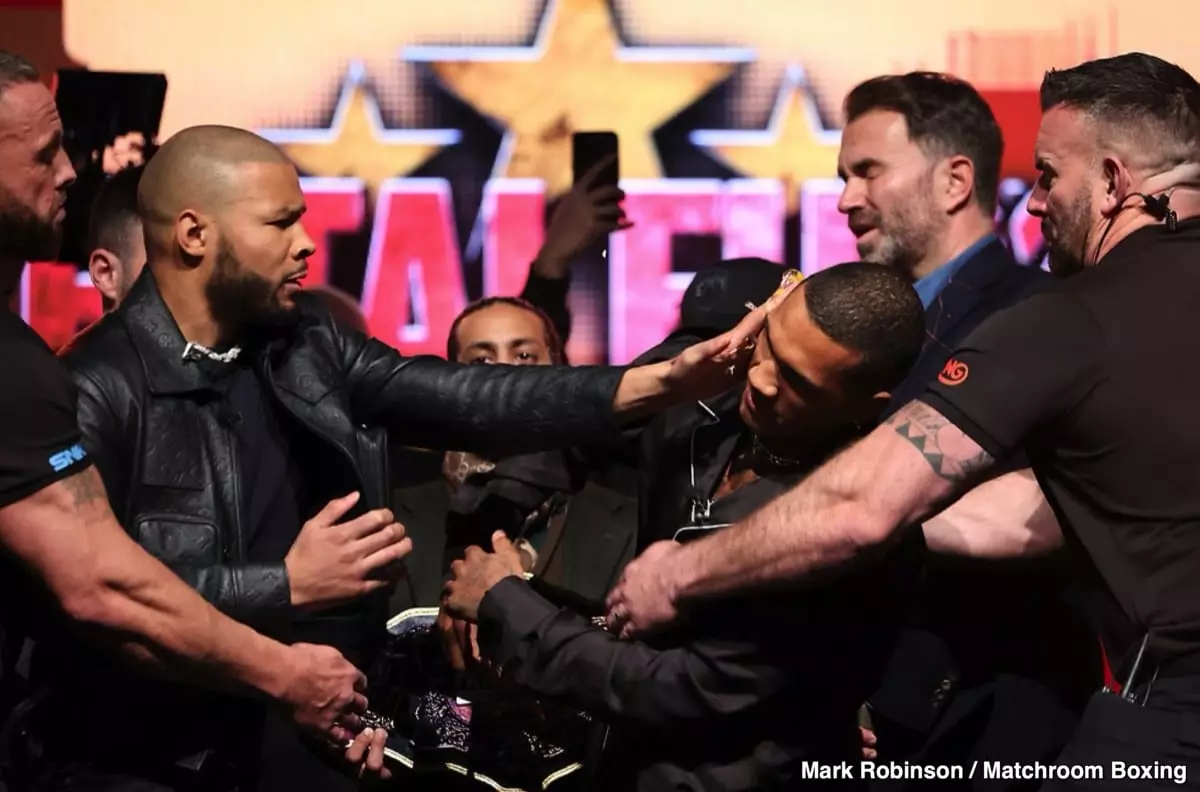The world of professional boxing is often marked by intense rivalries, electrifying fights, and, at times, unexpected chaos that transcends the ring. Recently, an incident occurred during a press conference that encapsulates the volatile mix of emotions, promotions, and personal dynamics inherent in this sport. The confrontation between Ben Shalom and Eddie Hearn, stemming from a provocative incident involving fighters Chris Eubank Jr. and Conor Benn, raises crucial questions about sportsmanship, promotional tactics, and the responsibilities of those who manage fighters.
The press conference held at Manchester Central was intended as a platform to hype the upcoming April 26th fight between Eubank Jr and Benn at the Tottenham Hotspur Stadium in London. However, it quickly devolved into a spectacle when Eubank Jr. playfully threw an egg at Benn, provoking a physical reaction from Hearn that surprised many observers. Shalom, Eubank Jr.’s promoter, was taken aback when Hearn shoved him in response, igniting a firestorm of discussion regarding sportsmanship and professionalism.
Shalom’s bewilderment at being singled out by Hearn for the shove is a reflection of the delicate power dynamics that exist among promoters. It showcases how personal emotions can overshadow professional responsibilities, leading to actions that could detract from the larger goal of promoting and selling a fight. Promoters are expected to navigate the charged atmosphere of fighter rivalries while maintaining a level of decorum that reflects the professionalism of the sport. Hearn’s reaction not only raises questions about his emotional state but also highlights the complexities of interpersonal relationships among promoters, particularly in high-stakes situations.
A critical analysis of this incident reveals underlying ethical considerations in promotions. Shalom emphatically noted Hearn’s need to keep the fighters apart due to the potential for further escalation, underscoring a pivotal aspect of boxing promotions: the balance between generating excitement and ensuring safety. Hearn’s concern that the fighters might engage in a physical altercation reflects the inherent risks involved when emotions run high. While heated rivalries can effectively drive ticket sales and viewership, there remains an unspoken ethical obligation to prevent situations that could jeopardize the fighters or the integrity of the event.
Moreover, Shalom’s remarks hint at the responsibility promoters bear in shaping narratives around fights. Shalom argues that Eubank Jr.’s actions weren’t calculated as a promotional tactic but rather a culmination of built-up tension over the years. This perspective raises the question of authenticity in promotions: How much of what we see leading up to a fight is genuine passion and how much is performative? Promoters must tread carefully, ensuring that their portrayal of events enhances the integrity of the sport rather than reduces it to mere theatrics.
The role of promoters in boxing can often be overlooked in favor of the fighters who step into the ring. However, incidents like the one between Shalom and Hearn emphasize the vital role promoters play in the boxing ecosystem. Their decisions influence fight outcomes, promotional strategies, and the safety of everyone involved. Shalom’s remarks about Hearn “squaring up” to him like a schoolyard bully suggest that both men may need to reconsider their approaches in these high-pressure environments.
Furthermore, the incident may serve as a wake-up call for the boxing community to rethink how promotional events are conducted. The emphasis should be on creating a professional atmosphere that fosters respect while still stoking interest in the fight. It’s a convoluted balance: Igniting anticipation of a match while minimizing the risk of violence that could detract from it.
The confrontation between Ben Shalom and Eddie Hearn during a seemingly innocuous press conference highlights the intricacies of managing emotions, rivalries, and promotions in boxing. As the sport continues to evolve, learning from these incidents emerges as a paramount concern for promoters and fighters alike, ensuring that the integrity of boxing remains intact amidst personal conflicts and promotional theatrics. The challenge lies not just in who wins the fight, but in how the fight is sold and perceived by the public at large.


Leave a Reply